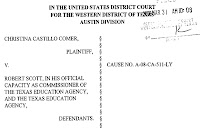 The judge’s ruling in Chris Comer's case against the Texas Education Agency is on the NCSE website here. Judge Lee Yeakel’s decision has a fair amount of legal jargon, particularly at the start, but it’s reasonably understandable.
The judge’s ruling in Chris Comer's case against the Texas Education Agency is on the NCSE website here. Judge Lee Yeakel’s decision has a fair amount of legal jargon, particularly at the start, but it’s reasonably understandable.Comer’s lawyers argued that the Texas Education Agency (TEA), by having a “neutrality” policy on evolution, violated the first amendment of the U.S. constitution (the Establishment Clause) that separates Church and state. In particular, Comer’s lawyers used the “Lemon test” (named after a plaintiff, not the fruit) which has three “prongs” that are used to determine if an action violates that clause.
The TEA says they are neutral on all policies that the Texas State Board of Education might set. TEA don’t set the curriculum. And the judge agreed. Here’s a snippet from page 15.
Agency staff must remain neutral on contested curriculum issues, no only creationism and evolution. The policy is reasonable, given the elected body (Texas State Board of Education - ZF) the Agency supports. The Agency supports 15 elected Board members who often disagree among themselves regarding curriculum issues and who make final decisions regarding such disputed issues. Agency staff, by virtue of their job description, must avoid acting in ways that favor any particular Board member’s position.
This seems to be the legal crux of the decision. The decision also notes that religious ideas may benefit from TEA’s neutrality policy, but this is an incidental effect.
In light of the recent vote on Texas K-12 science standards, however, I find this bit in Judge Yeakel’s decision very interesting.
The State “readily agree[s] that if the Board chooses to consider including some kind of recognition of alternatives to evolutionary theory in the biology curriculum, it will be entering perilous waters,” but that is the Board’s voyage to weather.
We’ll see how rough the waters get in about two years, when textbook adoptions come up.

No comments:
Post a Comment